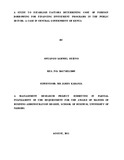| dc.description.abstract | The overall objective of Government of the Republic of Kenya’s debt management policy is to
meet the central government’s financing needs at the lowest possible long term borrowing cost
with prudent degree of risk. All major development projects targeted by government require
huge financing much in excess of what it can raise directly through taxation hence it must look
for the excess from outside its normal taxation.
Over the years, Kenya has neither enjoyed a balanced nor a surplus budget. The budgeting
process has always been based on a deficit to be filled through borrowings, locally and abroad. It
is at this point that the financial system that includes international sources facilitates Government
to bridge the deficit (GoK annual public debt management report, 2010).
Economists maintain that social/national wealth increases only if the benefits from specific
projects/investments exceed the costs of those projects. Project costs are varied depending on the
type and the sector of the project. However all borrowings for investments have one type of cost,
the financing cost. It is therefore prudent to borrow for investments only if it is cost effective,
that is, when the costs associated with debt financing and likely effects on the economy as a
whole is beneficial.
It should be recognized at the outset that the cost of capital is one of the most difficult and
disputed topics in the foreign loan theory. Financial experts express conflicting opinions as to the
way in which the cost of capital can be measured. It should be noted that it is a concept of vital
importance in the financial decision making especially in evaluating investment decisions,
designing a firm’s debt policy and appraising the performance of the firms’ top management,
(Pandey.I.M 2004).
This study went ahead to establish factors determining cost of external borrowing for investment
financing in Kenya by analyzing data collected from both primary (key participants in
investment financing like Debt Officers, Finance Officers, Accountants, Economists among
others from both GoK and DPs) and secondary data from various sources.
In summary the study established that factors determining the cost of external borrowing towards
investment financing in GoK, can be concluded to be: Legal and policy framework factors;
Interest and transaction cost factors; Donor condition factors; Commitment fee; Economic
factors; Political factors, management factors among others.
The study also recommended putting in place proper legislative and policy framework to
safeguard against the lenders taking advantage of the loopholes in the financial system,
developing capacity building plans to strengthen skills and knowledge of the officers
participating in investment financing among others. | en |

